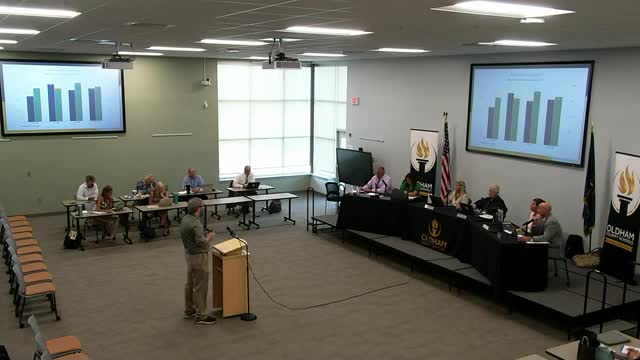Schools face device crisis as technology ages
August 27, 2024 | Oldham County, School Boards, Kentucky
This article was created by AI summarizing key points discussed. AI makes mistakes, so for full details and context, please refer to the video of the full meeting. Please report any errors so we can fix them. Report an error »

In a recent government meeting, officials discussed the varying approaches to technology provision across schools, particularly focusing on the leasing and purchasing of devices such as Chromebooks. The conversation highlighted inconsistencies in how schools manage technology resources, with some institutions providing devices while others rely on parents to lease or purchase them independently.
One key point raised was the need for alignment in device management across the district. Currently, North Middle School is noted as a unique case where leased devices are retained longer than usual due to specific administrative processes. This has resulted in higher inventory numbers for that school compared to others.
The discussion also touched on the concept of \"end of life\" for devices, which is critical for maintaining security and functionality. Officials indicated that most devices have a useful life of about seven years, and many schools will face significant replacements between 2027 and 2029 as devices reach their end of life. Estimates suggest that around 1,600 devices will need replacement, with potential increases depending on future assessments.
The meeting underscored the importance of proactive planning in technology management to avoid falling behind in device replacement. Officials are considering more aggressive strategies to ensure that the district stays ahead of its technology needs, emphasizing the necessity of balancing the useful life of devices with their end-of-life timelines.
One key point raised was the need for alignment in device management across the district. Currently, North Middle School is noted as a unique case where leased devices are retained longer than usual due to specific administrative processes. This has resulted in higher inventory numbers for that school compared to others.
The discussion also touched on the concept of \"end of life\" for devices, which is critical for maintaining security and functionality. Officials indicated that most devices have a useful life of about seven years, and many schools will face significant replacements between 2027 and 2029 as devices reach their end of life. Estimates suggest that around 1,600 devices will need replacement, with potential increases depending on future assessments.
The meeting underscored the importance of proactive planning in technology management to avoid falling behind in device replacement. Officials are considering more aggressive strategies to ensure that the district stays ahead of its technology needs, emphasizing the necessity of balancing the useful life of devices with their end-of-life timelines.
View full meeting
This article is based on a recent meeting—watch the full video and explore the complete transcript for deeper insights into the discussion.
View full meeting
